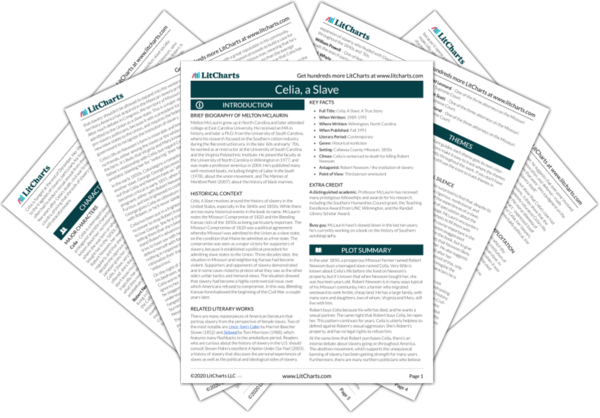Minor Characters
Virginia Newsom Waynescot
The daughter of Robert Newsom.
Harry Newsom
The eldest son of Robert Newsom.
James Coffee Warnescot
Child of Virginia Newsome Waynescot, and the grandson of Robert Newsom.
David Newsom
The teenaged son of Robert Newsom.
Amelia
Daughter of Virginia Newsome Waynescot, and the granddaughter of Robert Newsom.
Thomas
Child of Virginia Newsome Waynescot, and the grandson of Robert Newsom.
Billy
Child of Virginia Newsome Waynescot, and the grandson of Robert Newsom.
Mary
Youngest daughter of Robert Newsom.
Susan Jameson
Daughter of John Jameson.
John H. Jameson
Son of John Jameson.
John C. Calhoun
South Carolina senator (and later vice president of the United states) who was instrumental in supporting the expansion of slavery in the United States’ new western territory.
David R. Atchinson
Missouri senator and slavery supporter whose dirty tactics and aggressive style of leadership were an important factor in the outbreak of violence in Missouri and Kansas in the 1850s.
Thomas Hart Benton
Missouri senator and opponent of the expansion of slavery, who feuded with David R. Atchinson throughout the 1840s and ‘50s.
William Powell
One of Robert Newsom’s neighbors, who leads the search party on the morning following Robert’s death.
D. M. Whyte
Justice of the peace who, with Isaac Howe, leads the inquest into Robert Newsom’s death.
Isaac P. Howe
Justice of the peace who, with D. M. Whyte, leads the inquest into Robert Newsom’s death.
Toussaint L’Ouverture
Haitian slave who led a successful slave revolt against the French colonial state, leading to Haiti becoming a democracy at the end of the 18th century.
Nat Turner
Virginia slave preacher who led a failed slave revolt that resulted in dozens of deaths.
Thomas Shoatman
Resident of Callaway County, who, along with Jefferson Jones, leads Celia’s interrogation leading up to her trial.
Jefferson Jones
Resident of Callaway County, who, along with Thomas Shoatman, leads Celia’s interrogation leading up to her trial.
Stephen Douglas
Influential Illinois politician who supported the Kansas-Nebraska Act, which allowed new territories to vote on the legality of slavery.
James Shannon
President of the University of Missouri, and a notable supporter of slavery.
Governor Andrew Reeder
First governor of the territory of Kansas.
President Franklin Pierce
The 14th president of the United States of America.
Governor William Shannon
Second governor of the territory of Kansas, following the abrupt dismissal of Governor Andrew Reeder.
Judge William Augustus Hall
Judge during Celia’s trial for murder.
Nathan Chapman Kouns
One of the two attorneys, along with Isaac M. Boulware, selected to assist John Jameson with Celia’s defense in 1855.
Isaac M. Boulware
One of the two attorneys, along with Nathan Chapman Kouns, selected to assist John Jameson with Celia’s defense in 1855.
Alexander Campbell
Religious leader of the Disciples of Christ, a Presbyterian movement.
R. G. Prewitt
A young, relatively inexperienced attorney who prosecutes Celia in 1855. While Prewitt is of obvious importance to the story of Celia’s trial, McLaurin offers very little information about his life, character, or legal actions.
Dr. James M. Martin
Prominent Missouri doctor who testifies for the defense during Celia’s trial.
Abiel Leonard
One of the three attorneys on the Missouri State Supreme Court.
William Scott
One of the three attorneys on the Missouri State Supreme Court.
John F. Ryland
One of the three attorneys on the Missouri State Supreme Court.
